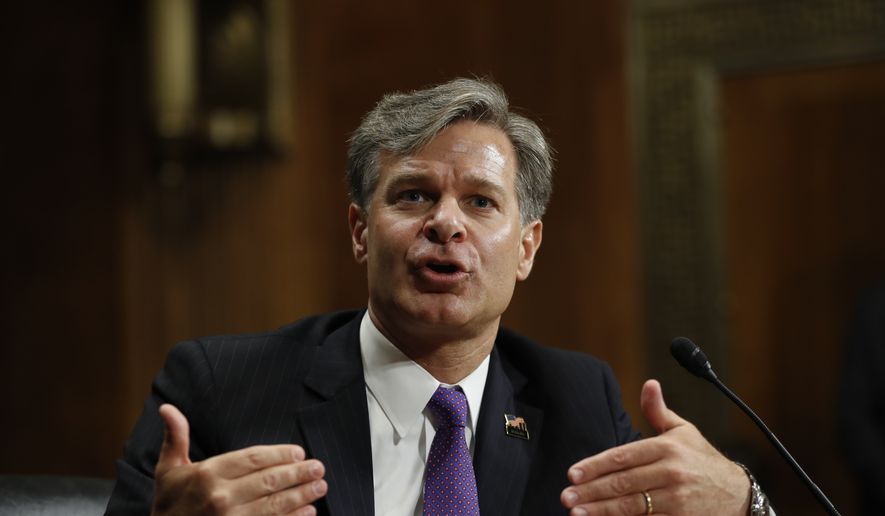The Senate overwhelmingly voted to approve Christopher Wray as the new FBI director Tuesday, with both Republicans and Democrats expressing confidence he will lead an independent bureau and shield his investigators from political interference.
President Trump nominated Mr. Wray, an assistant attorney general under President George W. Bush now in private practice, to fill the post left vacant in May after he abruptly fired James B. Comey, who was overseeing a probe into Trump campaign officials’ dealings with Russia surrounding last year’s election.
Mr. Comey’s firing set off a chain that led to the appointment of special counsel Robert Mueller to lead the Russia investigation, though the FBI, now under Mr. Wray, will still provide the bulk of investigative power.
“Mr. Wray was asked directly what he would do if presented with the opportunity to influence these investigations in any way. He told the committee that he won’t condone tampering with investigations, and that he would resign rather than be unduly influenced in any manner,” said Senate Judiciary Committee Chairman Charles Grassley, Iowa Republican. “Mr. Wray’s record of service, and his reputation, give us no reason to doubt him.”
The confirmation marked somewhat of a breakthrough after months of Democrats slow-walking Trump nominees in the Senate.
Minority Leader Charles E. Schumer said Democrats had been obstructing to register their disapproval of how the GOP was handling the health care debate, but with that now over the confirmation process can go faster. A group of eight Defense Department nominees was approved Tuesday evening.
“I always said after health care was over, we’d try to get together on a good package and we’re making headway in that regard,” Mr. Schumer said.
Mr. Wray was confirmed on a 92-5 vote, with all five of the dissents coming from Democrats: Sens. Kirsten Gillibrand, Ed Markey, Jeff Merkley, Elizabeth Warren and Ron Wyden.
Mr. Wyden said he voted against the nomination because of Mr. Wray’s stance on privacy issues.
“In his public and private statements, Chris Wray failed to oppose government back doors into Americans’ personal devices, or to acknowledge the facts about encryption — that it isn’t about liberty versus security, it’s about more security versus less security,” the Oregon Democrat said.
Mr. Wray has been working as a corporate lawyer at King & Spalding LLP for more than a decade. His last post in the federal government was in 2005, when he headed the Justice Department’s sprawling criminal division.
He also brings counterterrorism and counterespionage expertise to the table, having worked on those issues for the Justice Department after the Sept. 11, 2001, terror attacks. Before that, he served as a federal prosecutor in Atlanta.
In private practice, Mr. Wray recently served as a personal attorney for New Jersey Gov. Chris Christie during the “Bridgegate” scandal. He has also represented a slew of Fortune 100 companies under state and federal investigations, including Johnson & Johnson and Credit Suisse AG.
While he will be under the microscope at the FBI, Mr. Wray earned bipartisan support during his confirmation hearing, when he promised lawmakers that he was outside the president’s sphere of influence and would resist any efforts to politicize the bureau as it helps investigate the Russia scandal.
“If I am given the honor of leading this agency, I will never allow the FBI’s work to be driven by anything other than the facts, the law and the impartial pursuit of justice. Period. Full stop,” Mr. Wray told the Judiciary Committee during his confirmation hearing. “My loyalty is to the Constitution and the rule of law.”
That commitment was enough to win over skeptical Democrats, including Sen. Kamala Harris, who has opposed other Trump nominees.
The California Democrat said it was “fundamentally important” that the FBI director be “committed to the rule of law or transparency” and “respect the necessary separation between the Department of Justice and the White House.”
Sen. Dianne Feinstein, who questioned Mr. Wray during his confirmation hearing about his stance on torture because of his service in the Bush administration, said she was satisfied with his answers on those matters. But she warned that his resolve on the independence of the FBI could face a test early on in his term.
“I believe the next FBI director’s independence, integrity and commitment to the rule of law, sadly, will likely be tested by this administration,” the ranking Democrat on the Senate Judiciary Committee said.
Mr. Wray is expected to be sworn into office Wednesday.
⦁ Stephen Dinan contributed to this report.
• Andrea Noble can be reached at anoble@washingtontimes.com.




Please read our comment policy before commenting.